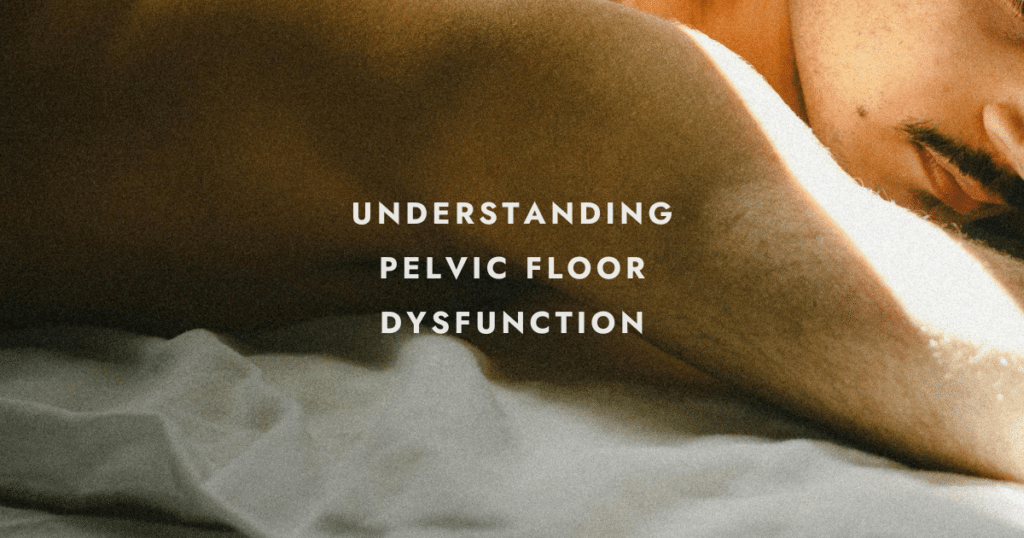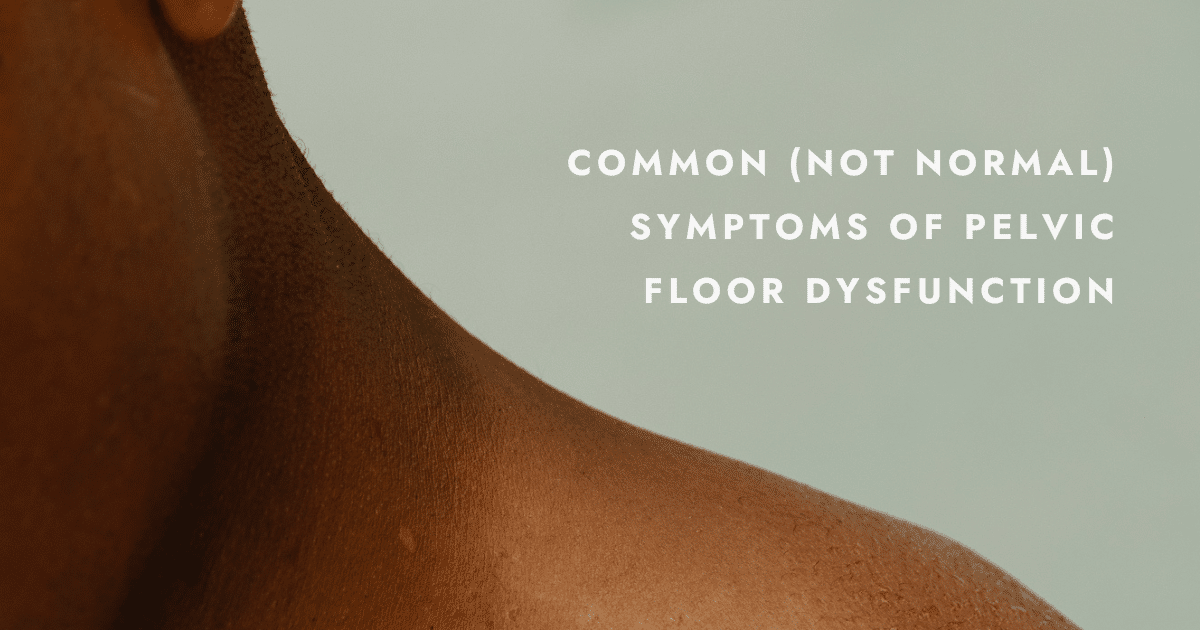Did you know that approximately 25% to 50% of people assigned female at birth experience urinary incontinence at some point in their lives? When it comes to fecal incontinence – about 1 in 12 adults worldwide are impacted, although this number may be higher due to underreporting.
Despite their prevalence, these issues often remain shrouded in silence and stigma. In this blog post, we delve into the realm of bowel and bladder health and how it might be related to your pelvic floor!

Understanding pelvic floor dysfunction
Before we go any further, it’s essential to have a clear understanding of your pelvic floor and what a pelvic floor disorder may look like.
Pelvic floor dysfunction (PFD) is an umbrella term referring to a wide range of symptoms and anatomical changes associated with altered function of the pelvic floor musculature. If you want to learn more about your pelvic floor in greater detail or do our pelvic floor screening test, you can do that by clicking here.
Approximately 32% of people assigned female at birth experience symptoms of pelvic floor dysfunction, while 16% of people assigned male at birth experience PFD. However, this health topic remains highly taboo.
Historically, PFD has been brushed off by many medical professionals as just “something to deal with”, especially in the postpartum or elderly populations. Many people experiencing bladder and bowel symptoms associated with PFD delay or even avoid medical treatment due to feelings of shame, guilt or stigmatization.
This can have profound negative impacts on individuals’ quality of life as symptoms like incontinence and prolapse can result in decreased participation in daily activities, reduced satisfaction with sexual relationships, and negative impacts on work & home life and psychological well-being.
Fortunately, as more research into these conditions is being conducted and knowledge of pelvic floor physical therapy continues to spread, this is slowly changing.
Pelvic floor physical therapy has been shown to significantly reduce symptoms of PFD.
So, although these symptoms are common, they do not have to be normal. If you experience PFD – There is hope!

Common (Not Normal) Symptoms of Pelvic Floor Dysfunction
Common bladder and bowel symptoms indicative of PFD include:
- Leaking pee with exercise, coughing, laughing or sneezing
- Bladder urgency or difficulty emptying your bladder
- Constipation or difficulty with bowel movements
- Fecal incontinence
- Difficulty controlling gas
- Sensation of pressure of bulging in your vaginal region
- Back, hip or pelvic pain
Common diagnoses treated in pelvic floor physical therapy include:
- Urinary frequency
- Urinary incontinence
- Constipation
- Fecal incontinence
- Pelvic organ prolapse
Bowel and bladder health: Understanding signs and symptoms
Urinary Frequency and Incontinence
Urinary frequency is how frequently you have to urinate throughout the day or at night. Urinary incontinence is any unintentional leakage of urine. Research shows that approximately 5% of the population experiences urinary incontinence.
Clinical Signs and Symptoms
- Leaking urine while exercising, bending, coughing, or lifting
- Leaking urine without warning or urge
- Being unable to hold urine after a sudden urge
- Frequent urination
- Waking up at night to urinate
- Urinating during sleep
- Problems passing urine, like a slow stream, straining or stopping and starting
- Problems after passing urine, like feeling like the bladder isn’t empty or passing a few drops after finishing
Constipation
Constipation generally means passing fewer than three stools a week or having a difficult time passing stool. Chronic constipation affects about 15% of the United States population.
Clinical Signs and Symptoms:
- Fewer than three bowel movements per week
- Hard, dry, or lumpy stools
- Straining or pain when passing stools
- Feeling like the bowel hasn’t fully emptied
- Bloating
- Abdominal cramps
- Feeling sluggish
- Nausea and vomiting
Fecal Incontinence
Fecal incontinence, also known as encopresis or bowel incontinence, is the involuntary loss of stool or mucus from the bowels. Fecal incontinence affects about one in 10 people. This condition is more common in women and people over the age of 65.
Clinical Signs and Symptoms:
- Leaking stool when not using the toilet
- Passing stool before reaching the toilet
- Sudden, uncontrollable urges to have a bowel movement
- Soiling oneself without realizing the need to use the toilet
- Leaking stool when passing gas or during physical activity
- Finding stool in underwear after a regular bowel movement
- Loss of complete bowel movement control
- Passing solid or liquid stool without awareness
Pelvic Organ Prolapse
Pelvic organ prolapse is when one or more pelvic organs drop from their position. The muscles and connective tissues of the pelvic floor typically hold the pelvic organs in place. Pelvic organs include the vagina, bladder, uterus, urethra and rectum.
When pelvic organs drop from their normal position and bulge into the vaginal wall or canal, it can cause symptoms related to bladder and bowel function.
Pelvic organ prolapse (POP) can range in prevalence from 3–6% when defined by symptoms, to up to 50% when defined by vaginal examination. A 2019 study found that about 40% of women worldwide experience POP. However, depending on the definition of POP, the prevalence can range from 25–97% of the population.
Clinical Signs/Symptoms:
- A feeling of heaviness around your lower tummy and genitals
- A dragging discomfort inside your vagina
- Feeling like there’s something coming down into your vagina – it may feel like sitting on a small ball
- Feeling or seeing a bulge or lump in or coming out of your vagina
- Discomfort or numbness during sex
- Problems peeing – such as feeling like your bladder is not emptying fully, needing to go to the toilet more often, or leaking a small amount of pee when you cough, sneeze or exercise (stress incontinence)
- Sometimes pelvic organ prolapse has no symptoms and is found during an internal examination carried out for another reason, such as cervical screening.

What’s happening in your body?
So, what’s the link between your pelvic floor and your bowel and bladder health? Your pelvic floor muscles play a vital role in controlling bowel and bladder movements. When these muscles are weak or maybe even too tight, it can lead to various issues with bowel and bladder function.
For instance, if your pelvic floor muscles are too tight or tense, it can lead to difficulties with bowel movements, resulting in constipation. Tight pelvic floor muscles may inhibit the relaxation needed for proper bowel movements, making it challenging to pass stool comfortably. This tension can also contribute to pelvic pain and discomfort during bowel movements.
On the other hand, if your pelvic floor muscles are weak or unable to effectively contract, it can result in fecal incontinence.
Weak pelvic floor muscles may struggle to provide the necessary support to maintain continence, leading to accidental leakage or loss of control over bowel movements. This can occur during activities such as coughing, sneezing, or lifting, as well as during bowel movements themselves.
In both cases, addressing pelvic floor health through targeted exercises and therapy can help improve muscle strength, coordination, and function.
Pelvic floor exercises can help strengthen weak muscles, while relaxation techniques and manual therapy can help alleviate tension in tight muscles. By addressing pelvic floor dysfunction, individuals can improve their bowel and bladder control, reduce symptoms of constipation and fecal incontinence, and enhance their overall pelvic health and quality of life.
If you want to check in on your bowel or bladder health – you can always schedule a free 15-minute consultation with one of our doctors of physical therapy. Just call 1-888-803-4244 and you’ll be put in touch for a no-strings attached conversation.
Dr. Michelle Komrower and Dr. Liz Stadler







